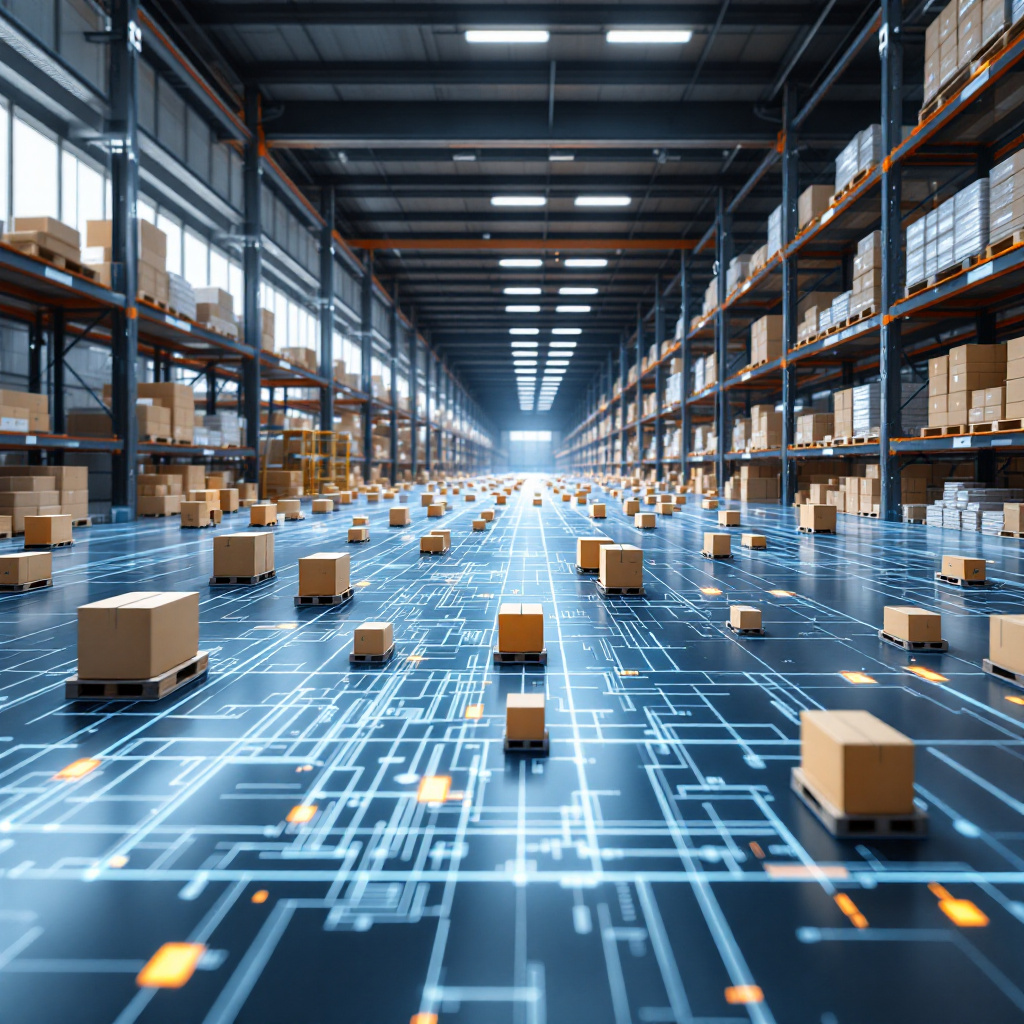AI in logistics: The Digital Transformation in Freight Forwarding
Artificial Intelligence (AI) is reshaping how the logistics industry operates, influencing not just transportation but also the way information flows across the supply chain. In this context, AI in logistics is no longer a futuristic concept; it is a practical solution enhancing speed, transparency, and efficiency. The market for AI in logistics and supply chain management was valued at approximately US$3.04 billion in 2022, with projections signaling rapid expansion as companies integrate new technologies.
The demand for faster operations without sacrificing accuracy drives this transformation. The freight forwarding industry—responsible for coordinating shipments across carriers, modes, and borders—faces intense pressure to deliver timely results even as complexity grows. Increasing customer expectations for real-time updates mean that forwarders need tools capable of interpreting vast data sets instantly. AI technologies are leading this shift through predictive analytics, automation, and advanced AI algorithms that can adjust to changes in operational conditions on the fly.
According to industry insights, forwarders are seeing how AI helps not only in processing but also in enhancing customer satisfaction by reducing delays and errors. Many logistics companies recognize that AI will play a significant role in remaining competitive. AI systems can process vast amounts of structured and unstructured data, enabling transportation management systems to dynamically adapt to disruptions like weather or port congestion. For example, AI can automatically adjust routes or recommend alternative freight services, streamlining the freight and making logistics operations more resilient.
By integrating AI solutions, freight forwarders work more efficiently, cut costs, and offer added value to clients. With companies like virtualworkforce.ai offering AI assistant capabilities to optimize email communication between logistics teams, operational bottlenecks like manual email handling are significantly reduced. The impact of AI extends to every aspect of chain logistics, revolutionizing freight coordination and giving forwarders a stronger competitive edge.

Automate Quoting and Customer Interactions with AI Tool
Traditional freight quote generation involves manually gathering rates from multiple carriers, a slow and error-prone approach in the freight forwarding industry. This process can delay responses, create inconsistencies, and reduce competitiveness. By choosing to automate this task, forwarders can transform how they engage with prospective clients.
An AI tool can instantly analyze large datasets, comparing historical rates, seasonal factors, and current market conditions to supply real-time, data-driven quotes. As noted by CIFFA, perhaps the greatest opportunity for AI in freight forwarding is in the quoting process. AI improves accuracy and speed, leading to higher customer satisfaction and increased conversion rates. AI simplifies the customer interaction process, enabling instant responses that demonstrate how AI ensures timely and relevant communication.
AI can automatically pull information from multiple sources and even integrate with a transportation management system to ensure consistency across channels. virtualworkforce.ai, for instance, offers forwarding companies an AI email integration that can respond to complex queries with precise details grounded in live data, significantly streamlining the customer interaction phase. This AI automation allows faster turnaround while also reducing internal workload.
The advantages of AI in this area are clear: faster responses improve the chances of securing shipments, accuracy boosts trust, and automation sets a standard in an industry where timing can determine success. Given that 45% of shippers leave freight forwarders over poor technology, investing in AI could be the difference between growth and losing customers.
Drowning in emails? Here’s your way out
Save hours every day as AI Agents label and draft emails directly in Outlook or Gmail, giving your team more time to focus on high-value work.
Workflow Optimisation for Freight Forwarders
AI-driven workflow optimisation is transforming the way freight forwarders operate. From task assignment to shipment monitoring, AI offers an integrated approach that bridges gaps in communication and execution. AI streamlines operational processes by ensuring every stakeholder has access to accurate, real-time information.
Sedna notes that AI solutions are reshaping freight forwarding by boosting efficiency and reducing costs. AI allows forwarders to synchronise communication across departments, enabling logistics teams to collaborate more effectively. This alignment reduces human error and prevents delays caused by miscommunication.
Platforms integrating AI systems can process unstructured data from various channels to prioritise tasks, automatically flagging urgent actions such as delayed shipments or changes in documentation. AI ensures operational priorities are addressed without oversight, something especially critical during peak logistics operations. With AI assistants embedded into email threads, forwarders can avoid losing context, which traditionally hampers productivity and responsiveness.
For example, virtualworkforce.ai integrates with ERP, TMS, and WMS systems, allowing AI agents to handle correspondence that previously required manual checking. This frees human staff to focus on decision-making rather than repetitive updates. Logistics firms embracing AI adoption in workflows see lower costs, higher throughput, and smoother operational flow, directly impacting customer satisfaction and retention.

AI solutions for shipment: Smart Route Planning and Real-Time Updates
One of the most significant AI applications in the freight forwarding sector is intelligent route planning. By analysing live traffic and weather data, AI ensures shipments are planned for optimal efficiency. As Jenkar Shipping highlights, AI can now analyse large volumes of historical and real-time data to recommend more efficient transport routes.
AI solutions for shipment management involve predicting potential delays and suggesting alternate routes in real time. AI systems also generate alerts, keeping freight shippers, carriers, and clients updated without delay. This transparency strengthens relationships and helps freight forwarders reduce costs associated with inefficiencies. AI helps freight forwarders by automating monitoring, making logistics solutions more adaptive and responsive.
Implementing AI in transportation management not only saves time but also lowers costs by shortening transit times and avoiding disruptions. AI algorithms take into account various dynamic factors, ensuring forwarding companies can use AI to maximise efficiency. Virtualworkforce.ai extends this capability by providing AI email integrations that communicate these updates directly into client-facing interactions, ensuring no missed details.
By integrating AI without overhauling the entire freight process, forwarders gain operational flexibility while adopting the latest AI technologies. These efficiencies contribute to a better logistics experience for all stakeholders, with AI-powered predictive analytics enhancing decision-making from dispatch to delivery. Ultimately, AI offers a smarter, data-driven approach to route management and customer communication.
Drowning in emails? Here’s your way out
Save hours every day as AI Agents label and draft emails directly in Outlook or Gmail, giving your team more time to focus on high-value work.
Freight management: Quantitative Impact and Efficiency Gains
The impact of AI in freight management is measurable and impressive. Research shows that AI implementation has helped businesses cut logistics costs by 15% and improve service levels by 65%. These gains come from AI-enabled automation, accurate forecasting, and proactive issue resolution in freight forwarding operations.
Many freight shippers decide on partnerships based on technological capabilities; as noted earlier, 45% leave forwarders due to inadequate systems. AI is helping forwarders respond to competitive pressures with smarter tools. AI improves efficiency by removing manual processes and replacing them with intelligent automation that can handle high-volume, repetitive tasks without error. AI could also manage freight expense calculations in real-time, further reducing operational overhead.
From a return-on-investment perspective, integrating AI solutions produces cost savings and better service quality, enhancing customer loyalty. AI provides a foundation for advanced logistics solutions that adapt to market shifts with minimal disruption. By leveraging AI, freight forwarders by automating core processes can offer consistent, timely, and cost-effective freight forwarding services to their clients.
For more strategies on how AI can help you reduce operating costs, see our guide on reducing logistics expenses using AI. These advantages of AI adoption align with the ongoing digital shift in the logistics and freight forwarding sectors, preparing companies for a future driven by technology.
Future of freight forwarding: Embracing AI for Competitive Edge
The future of freight forwarding will be defined by those willing to adopt AI strategically. According to Raz Roenen, AI is unlocking speed, accuracy, and efficiency that were previously unattainable in airfreight. This reflects a broader wave where AI is seen as essential for maintaining relevance in global trade.
However, challenges for freight forwarders include data integration across multiple management systems and aligning teams to embrace technological change. Implementing AI requires clear objectives, structured data, and a commitment to continuous innovation. AI applications like generative AI, predictive analytics, and AI agents stand to further reshape how freight forwarders work, offering deeper insight into complex operational networks.
AI is helping forwarders improve functions far beyond operational efficiency. With tools such as virtualworkforce.ai’s AI email integrations, entire freight communications become more consistent and reliable. AI can help align customer service, operations, and planning into a unified, data-driven approach, ensuring that AI improves both internal performance and customer outcomes.
Freight forwarding companies can use AI as part of a phased strategy. This includes starting with AI solutions that integrate quickly with existing systems, such as AI email agents, before expanding into more complex AI automation for routing and freight services. By doing so, companies adopt AI without overwhelming their teams and can incrementally demonstrate the power of AI in improving service and profitability.
FAQ
What is AI in freight forwarding?
AI in freight forwarding refers to the use of artificial intelligence to automate, optimise, and enhance operations in international shipping coordination. This includes quoting, route planning, communication, and workflow automation.
How does AI improve quoting processes?
AI generates real-time, data-driven freight quotes by analysing vast datasets. This approach speeds up response times, eliminates errors, and improves customer satisfaction.
What are examples of AI applications in logistics?
Examples include predictive analytics for route optimisation, AI agents handling communication, automating shipment tracking updates, and generative AI for documentation. These applications streamline the logistics process end-to-end.
How does AI help with workflow optimisation?
AI automates task assignments, flags urgent issues, and facilitates real-time communication between logistics teams. This reduces human errors while improving operational efficiency.
What is the quantitative impact of AI on logistics?
Research shows AI adoption can reduce logistics costs by 15% and improve service levels by 65%. These results come from faster decision-making and proactive problem-solving.
Can AI manage real-time shipment updates?
Yes, AI solutions for shipment processing can send real-time alerts to carriers, forwarders, and clients. This transparency enhances trust and service quality.
What are the main challenges of implementing AI in freight forwarding?
Challenges include integrating AI with existing management systems, training teams, managing data quality, and ensuring security compliance across international operations.
How does AI email integration help freight forwarders?
AI email agents draft accurate responses by retrieving data from ERP, TMS, and other connected systems. This reduces email handling time and improves consistency in communication.
What is the future of AI in logistics?
The future will see AI more deeply embedded in freight management, from automated customs clearance to self-optimising transportation networks. Companies adopting AI now will hold a competitive advantage.
How can forwarders start with AI adoption?
Start small with AI tools that solve specific issues, such as quoting or email automation. As teams adapt, expand AI usage to cover more complex processes like route optimisation and predictive freight planning.
Ready to revolutionize your workplace?
Achieve more with your existing team with Virtual Workforce.